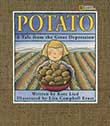Potato: A Tale from the Great Depression Q&A

Use these questions with children 7 to 9 years old to discuss the following economic concepts in Potato: A Tale from the Great Depression: barter, consumers, goods, services, income, and wants.
View all of our Parent Q&A resources.
Teachers: View the lesson plan using Potato: A Tale from the Great Depression.
Book written by Kate Lied (ISBN: 0-7922-6946-2).
Questions:
1. Income is the payment people earn for the work they do. At the beginning of the story, what kind of work did Clarence do to earn an income?
The story doesn’t tell what kind of work he did. It only says that he lost his job.
2. When Clarence lost his job, why did the bank take the family’s house away?
When Clarence lost his job, he didn’t have an income. Clarence and Agnes borrowed money from the bank to buy their house and were making payments to repay the loan. Without an income, they couldn’t make the house payments to the bank. The bank took the house away because Clarence and Agnes could not make the payments.
3. After Clarence lost his job, where did he find another job?
He found work in a coal mine.
4. Why did Clarence lose his job at the coal mine?
The coal mine closed.
5. Why did Clarence, Agnes, and Dorothy go to Idaho?
There were no other jobs available where they lived in Iowa, and someone told them there were jobs in Idaho picking potatoes.
6. Why did the family borrow money when they left to go to Idaho?
They needed money for gas to make the trip.
7. Did Clarence and Agnes find work when they got to Idaho?
Yes, they found work picking potatoes during the day.
8. Why did the family pick the leftover potatoes at night?
The owner said they could pick the leftover potatoes on their own time.
9. How long did the job picking potatoes last?
It lasted only two weeks.
10. What did the family do with all the leftover potatoes they picked each night?
They packed the borrowed car with potatoes and headed back to Iowa to trade the potatoes for other things.
11. Clarence and Agnes worked for an income picking potatoes during the day. Why did they not have any money to buy things when they returned home from Idaho?
They used the income they earned picking potatoes to pay for gas to make the trip home.
12. Goods are objects that can satisfy people’s wants. Services are actions that can satisfy people’s wants. Trading goods and services for other goods and services without using money is called barter.
- What were some of the goods the family received by bartering with potatoes after they returned home from Idaho?
They traded potatoes for goods such as groceries, clothes, and even a pig.
- What are some services the family might have received by bartering with potatoes?
Answers will vary, but the family might have bartered to have their car repaired.
13. Why would it be easier to use money to buy goods and services?
- Barter makes it difficult to know the right amount of one thing to trade for something else. For example, how many potatoes should be traded for a pig?
- Often it is difficult to divide items when bartering.
- People agree to trade only when they expect to gain from the trade. For example, a baker is not likely to trade a cake for potatoes. If the person who wants the cake had money, she could buy the cake. The baker would be willing to take the money because it can be used to buy something else.
14. People whose wants are satisfied by using goods and services are called consumers. Who were three consumers named in the story?
Clarence, Agnes, and Dorothy were consumers in the story.
15. Wants are desires that can be satisfied by consuming goods and services. People use the income they earn to buy things to satisfy their wants. What wants did Clarence, Agnes, and Dorothy have?
They wanted food, clothing, and a place to live.
16. How did Clarence earn an income at the end of the story?
The story says Clarence found a job but doesn’t tell what kind of work he did.
---
If you have difficulty accessing this content due to a disability, please contact us at 314-444-4662 or economiceducation@stls.frb.org.


